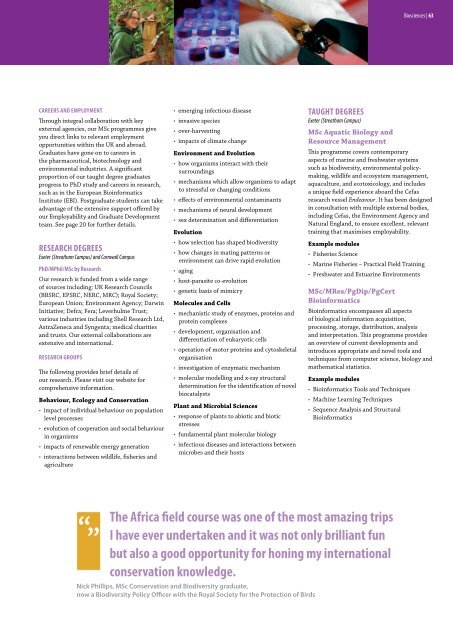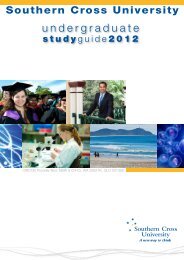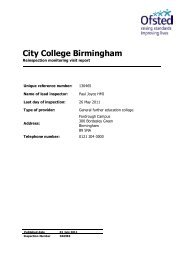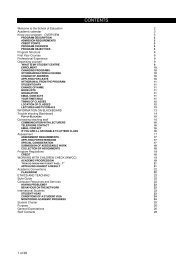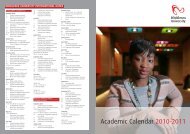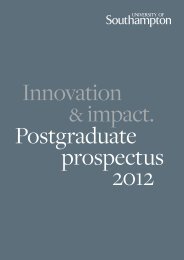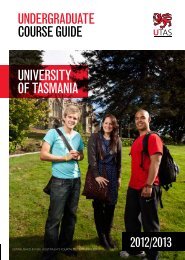Postgraduate Prospectus 2012 University of E xeter
Postgraduate Prospectus 2012 University of E xeter
Postgraduate Prospectus 2012 University of E xeter
Create successful ePaper yourself
Turn your PDF publications into a flip-book with our unique Google optimized e-Paper software.
Biosciences | 57 63<br />
Careers and employment<br />
Through integral collaboration with key<br />
external agencies, our MSc programmes give<br />
you direct links to relevant employment<br />
opportunities within the UK and abroad.<br />
Graduates have gone on to careers in<br />
the pharmaceutical, biotechnology and<br />
environmental industries. A significant<br />
proportion <strong>of</strong> our taught degree graduates<br />
progress to PhD study and careers in research,<br />
such as in the European Bioinformatics<br />
Institute (EBI). <strong>Postgraduate</strong> students can take<br />
advantage <strong>of</strong> the extensive support <strong>of</strong>fered by<br />
our Employability and Graduate Development<br />
team. See page 20 for further details.<br />
Research degrees<br />
E<strong>xeter</strong> (Streatham Campus) and Cornwall Campus<br />
PhD/MPhil/MSc by Research<br />
Our research is funded from a wide range<br />
<strong>of</strong> sources including: UK Research Councils<br />
(BBSRC, EPSRC, NERC, MRC); Royal Society;<br />
European Union; Environment Agency; Darwin<br />
Initiative; Defra; Fera; Leverhulme Trust;<br />
various industries including Shell Research Ltd,<br />
AstraZeneca and Syngenta; medical charities<br />
and trusts. Our external collaborations are<br />
extensive and international.<br />
Research groups<br />
The following provides brief details <strong>of</strong><br />
our research. Please visit our website for<br />
comprehensive information.<br />
Behaviour, Ecology and Conservation<br />
• impact <strong>of</strong> individual behaviour on population<br />
level processes<br />
• evolution <strong>of</strong> cooperation and social behaviour<br />
in organisms<br />
• impacts <strong>of</strong> renewable energy generation<br />
• interactions between wildlife, fisheries and<br />
agriculture<br />
• emerging infectious disease<br />
• invasive species<br />
• over-harvesting<br />
• impacts <strong>of</strong> climate change<br />
Environment and Evolution<br />
• how organisms interact with their<br />
surroundings<br />
• mechanisms which allow organisms to adapt<br />
to stressful or changing conditions<br />
• effects <strong>of</strong> environmental contaminants<br />
• mechanisms <strong>of</strong> neural development<br />
• sex determination and differentiation<br />
Evolution<br />
• how selection has shaped biodiversity<br />
• how changes in mating patterns or<br />
environment can drive rapid evolution<br />
• aging<br />
• host-parasite co-evolution<br />
• genetic basis <strong>of</strong> mimicry<br />
Molecules and Cells<br />
• mechanistic study <strong>of</strong> enzymes, proteins and<br />
protein complexes<br />
• development, organisation and<br />
differentiation <strong>of</strong> eukaryotic cells<br />
• operation <strong>of</strong> motor proteins and cytoskeletal<br />
organisation<br />
• investigation <strong>of</strong> enzymatic mechanism<br />
• molecular modelling and x-ray structural<br />
determination for the identification <strong>of</strong> novel<br />
biocatalysts<br />
Plant and Microbial Sciences<br />
• response <strong>of</strong> plants to abiotic and biotic<br />
stresses<br />
• fundamental plant molecular biology<br />
• infectious diseases and interactions between<br />
microbes and their hosts<br />
TAUGHT degrees<br />
E<strong>xeter</strong> (Streatham Campus)<br />
MSc Aquatic Biology and<br />
Resource Management<br />
This programme covers contemporary<br />
aspects <strong>of</strong> marine and freshwater systems<br />
such as biodiversity, environmental policymaking,<br />
wildlife and ecosystem management,<br />
aquaculture, and ecotoxicology, and includes<br />
a unique field experience aboard the Cefas<br />
research vessel Endeavour. It has been designed<br />
in consultation with multiple external bodies,<br />
including Cefas, the Environment Agency and<br />
Natural England, to ensure excellent, relevant<br />
training that maximises employability.<br />
Example modules<br />
• Fisheries Science<br />
• Marine Fisheries – Practical Field Training<br />
• Freshwater and Estuarine Environments<br />
MSc/MRes/PgDip/PgCert<br />
Bioinformatics<br />
Bioinformatics encompasses all aspects<br />
<strong>of</strong> biological information acquisition,<br />
processing, storage, distribution, analysis<br />
and interpretation. This programme provides<br />
an overview <strong>of</strong> current developments and<br />
introduces appropriate and novel tools and<br />
techniques from computer science, biology and<br />
mathematical statistics.<br />
Example modules<br />
• Bioinformatics Tools and Techniques<br />
• Machine Learning Techniques<br />
• Sequence Analysis and Structural<br />
Bioinformatics<br />
“<br />
“<br />
The Africa field course was one <strong>of</strong> the most amazing trips<br />
I have ever undertaken and it was not only brilliant fun<br />
but also a good opportunity for honing my international<br />
conservation knowledge.<br />
Nick Phillips, MSc Conservation and Biodiversity graduate,<br />
now a Biodiversity Policy Officer with the Royal Society for the Protection <strong>of</strong> Birds


